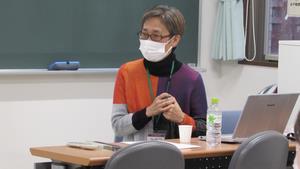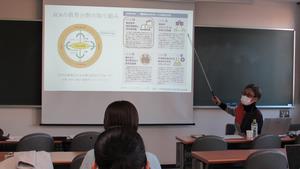- Global Collaboration Center
- Activity
- The report on 25th SDGs (Sustainable Development Goals) Seminar "JICA (Japan International Cooperation Agency)'s Support for Education" (Dec.2022)
ページの本文です。
The report on 25th SDGs (Sustainable Development Goals) Seminar "JICA (Japan International Cooperation Agency)'s Support for Education" (Dec.2022)
2023年4月21日更新
On Tuesday, December 20, 2022, the 25th SDGs Seminar "JICA's Support for Education" was presented by Ms. Miho Ota, Principal Consultant at Koei Research & Consulting Co.
In this seminar, we learned about JICA's cooperation projects in the education sector in Mozambique and what the role of consultants is in these projects.
I was first struck by the low net and gross enrollment rates in secondary education in Mozambique. There are several factors that contribute to this low enrollment rate, but it seems that not only the inability to go to school or the lack of available schools, but also the high dropout rate due to the low quality of education are strongly related. In addition to providing educational opportunities and teaching materials, we were reminded of the importance of providing support to improve the quality of education and teachers.
JICA's Projecto de Reforço à Implementação do Currículo do Ensino Primário (in Portuguese, PRICEP for short), which we heard at this seminar, is related to this improvement in the quality of education and teachers, and is a comprehensive approach that incorporates a series of steps in learning, from educational curriculum, to learning materials, to instruction, to the measurement of academic performance, into the project design. This PRICEP, which aims to improve learning in primary mathematics and science in Mozambique, is under implementation from March 2021 to February 2027 in partnership with the Mozambican Ministry of Education and Human Development. The approach of the project is as follows: first, revise the educational curriculum and programs in Mozambique, using the Japanese curriculum as a reference. Second, elementary math and science textbooks and teachers’ manuals will be revised in accordance with the revised curriculum and program. Then, training for the teachers and students of teacher training schools is provided so that they can teach with this revised textbook, with the aim of improving their teaching skills. Finally, guidelines for creating test questions and scoring methods for elementary math and science examinations will be developed, so that appropriate academic performance can be measured and evaluated. In this way, PRICEP provide support based on a series of learning processes (1) curriculum, (2) textbooks and learning materials, (3) teaching, and (4) academic achievement measurement and evaluation, and continue this cycle with the goal of further improving the quality of education.
In this seminar, we were shown an actual comparison between the current version of the math textbook and the revised one, and the differences between the two were particularly interesting. The current edition seemed to focus more on solving a large number of problems rather than on deepening understanding step by step. Therefore, not only would it be difficult for students to keep up with the lessons once they stumbled, but it also seemed difficult for teachers to give easy-to-understand lessons with this textbook. However, the revised edition carefully shows calculation procedures and examples so that students can understand even just by reading the textbook and can solve even difficult problems on their own. I used to think that all you need is a complete set of teaching materials, but textbook comparison made me realized that the content of textbooks also plays an important role in improving the quality of education and teaching and made me keenly aware of the importance of support such as PRICEP to review and improve textbooks.
Through this seminar, I was able to review my own "norm" and think about how educational support should be provided from a broader perspective. I was also impressed by the different players involved in supporting the education sector in developing countries, such as consultants. Thank you very much for the valuable presentation.
(Sakurako Furuse, sophomore student, Department of Liberal Arts and Humanities, Faculty of Letters and Education)
【Related Link】
※Project for Expansion of New Curriculum in Mozambique












